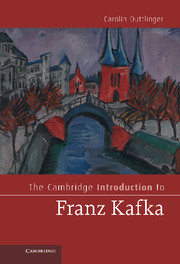Preface
Published online by Cambridge University Press: 05 June 2013
Summary
Kafka is one of the most iconic of modern writers and probably the most widely read German-language author of all times. A century on, his works have lost none of their strangeness and appeal; while the ‘Kafka industry’ continues to produce books and articles at a dizzying rate, Kafka’s influence is by no means limited to the ivory towers of academia. Indeed, he is one of the few authors whose fame straddles the boundary between high and popular culture. Yet Kafka’s enduring and almost universal popularity is something of a mixed blessing, since for many this might make him appear offputtingly trendy in a shallow, vaguely postmodern way. Surely an author whose works have appealed to so many cannot have real substance? Even if we are not deterred by Kafka’s fame, we cannot avoid the questions it poses. (Is Kafka perhaps too famous for his own good, too famous to be read seriously?) Arguably, we know both too much and too little about Kafka. The myth of Kafka the isolated, otherworldly genius seems to resist all evidence to the contrary, and his problematic relationship with his father – admittedly documented by Kafka himself – is often applied to his texts as a one-size-fits-all interpretative template. But Kafka has also often been cited as the Existentialist, nihilist, Zionist or Freudian writer par excellence, or as a kind of prophet who predicted the Holocaust. The dilemma surrounding Kafka’s fame is encapsulated by the term ‘Kafkaesque’. In contrast to similar coinages, such as ‘Shakespearean’, ‘Proustian’ or ‘Wildean’, ‘Kafkaesque’ is used not only as an adjective but also as a noun. ‘The Kafkaesque’ is a term not limited to literary contexts but which has become a shorthand for a wide range of artistic techniques, situations and experiences. The Oxford English Dictionary defines it as ‘Of or relating to the writings of Franz Kafka; resembling the state of affairs or a state of mind described by Kafka’.
- Type
- Chapter
- Information
- The Cambridge Introduction to Franz Kafka , pp. xi - xiiiPublisher: Cambridge University PressPrint publication year: 2013



